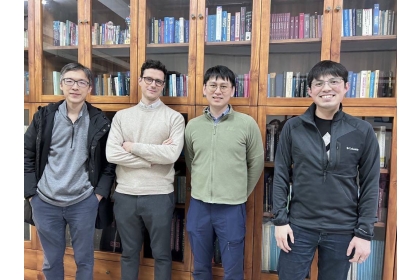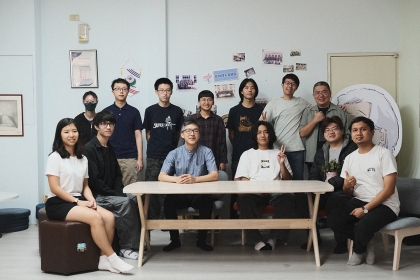New progress in quantum science! Assistant Professor Shin-Liang Chen from the Department of Physics of Chung Hsing University published two breakthrough studies in the top journal
2024-11-25
興新聞張貼者
Unit秘書室
1,635
Assistant Professor Shin-Liang Chen from the Department of Physics at National Chung Hsing University recently published two research papers in the top journal "Physical Review Letters" in the field of physics, which deeply explores the application of quantum nonlocality and uncertainty principles, bringing a new perspective to the application of quantum science and contributing to the practical development of relevant technologies.
The first paper mainly focuses on characterizing quantum temporal correlations. Assistant Professor Shin-Liang Chen, in collaboration with Professor Jens Eisert from Free University of Berlin, consider a central problem in quantum mechanics: Are the correlations of a single system at different points of time fundamentally different for quantum and classical observers? In this paper, the two researchers develop a mathematical tool to resolve this question.
Besides, they find out that this tool additionally provides some important applications, including 1) characterizing correlations of a single quantum system at different points of time, 2) computing the probabilities of measurement outcomes of a random system, and 3) ability of certifying specific quantum systems even when the measurement devices are imperfect.
In addition, the two researchers also find out that within this framework, one can include different types of physical constraints during the computation. For instance, 1) one can restrict the communication from the observer at earlier time to the observer at latter time, 2) one can also consider an upper bound on the dimension of the system, and 3) one can restrict the type of quantum measurements. Therefore, on the perspective of application on quantum science, the two researchers successfully open up a new direction for the future development of quantum certification.
The second paper mainly focuses on a thermodynamical interpretation of the uncertainty relation. Assistant Professor Shin-Liang Chen, in collaboration with Dr. Chung-Yun Hsieh from Bristol University in UK, investigate a fundamental principle of quantum mechanics—the uncertainty principle (also known as the Heisenberg uncertainty principle). They pose the question: Can a pair of measurements satisfying the uncertainty relation (also called incompatible measurements or non-commuting measurements) be characterized from a thermodynamic perspective? Quantum incompatibility refers to the phenomenon where a quantum measurement influences the predictability of another measurement result, displaying "incompatibility." In the field of quantum information, such incompatibility is regarded as a resource that can be applied to quantum encryption, state discrimination, and other technologies. However, the field of quantum thermodynamics has lacked a framework to quantify this incompatibility. This study proposes a novel method for quantifying incompatibility using thermodynamical approach by observing the effects of incompatible measurements on the thermal equilibrium of a system. It also explored how thermal equilibrium suppresses the quantum features of incompatible measurements.
These two papers make significant contributions to the foundational concepts of quantum science and hold great potential for applications in quantum technology. One of the future research directions of Assistant Professor Shin-Liang Chen’s team will be based on the important findings from these two studies, striving to further advance quantum science and technology.
References:
[1] Semi-Device-Independently Characterizing Quantum Temporal Correlations
Shin-Liang Chen and Jens Eisert
Phys. Rev. Lett. 132, 220201 (2024).
https://journals.aps.org/prl/abstract/10.1103/PhysRevLett.132.220201
[2] Thermodynamic Approach to Quantifying Incompatible Instruments
Chung-Yun Hsieh and Shin-Liang Chen*
Phys. Rev. Lett. 133, 170401 (2024).
https://journals.aps.org/prl/abstract/10.1103/PhysRevLett.133.170401
The first paper mainly focuses on characterizing quantum temporal correlations. Assistant Professor Shin-Liang Chen, in collaboration with Professor Jens Eisert from Free University of Berlin, consider a central problem in quantum mechanics: Are the correlations of a single system at different points of time fundamentally different for quantum and classical observers? In this paper, the two researchers develop a mathematical tool to resolve this question.
Besides, they find out that this tool additionally provides some important applications, including 1) characterizing correlations of a single quantum system at different points of time, 2) computing the probabilities of measurement outcomes of a random system, and 3) ability of certifying specific quantum systems even when the measurement devices are imperfect.
In addition, the two researchers also find out that within this framework, one can include different types of physical constraints during the computation. For instance, 1) one can restrict the communication from the observer at earlier time to the observer at latter time, 2) one can also consider an upper bound on the dimension of the system, and 3) one can restrict the type of quantum measurements. Therefore, on the perspective of application on quantum science, the two researchers successfully open up a new direction for the future development of quantum certification.
The second paper mainly focuses on a thermodynamical interpretation of the uncertainty relation. Assistant Professor Shin-Liang Chen, in collaboration with Dr. Chung-Yun Hsieh from Bristol University in UK, investigate a fundamental principle of quantum mechanics—the uncertainty principle (also known as the Heisenberg uncertainty principle). They pose the question: Can a pair of measurements satisfying the uncertainty relation (also called incompatible measurements or non-commuting measurements) be characterized from a thermodynamic perspective? Quantum incompatibility refers to the phenomenon where a quantum measurement influences the predictability of another measurement result, displaying "incompatibility." In the field of quantum information, such incompatibility is regarded as a resource that can be applied to quantum encryption, state discrimination, and other technologies. However, the field of quantum thermodynamics has lacked a framework to quantify this incompatibility. This study proposes a novel method for quantifying incompatibility using thermodynamical approach by observing the effects of incompatible measurements on the thermal equilibrium of a system. It also explored how thermal equilibrium suppresses the quantum features of incompatible measurements.
These two papers make significant contributions to the foundational concepts of quantum science and hold great potential for applications in quantum technology. One of the future research directions of Assistant Professor Shin-Liang Chen’s team will be based on the important findings from these two studies, striving to further advance quantum science and technology.
References:
[1] Semi-Device-Independently Characterizing Quantum Temporal Correlations
Shin-Liang Chen and Jens Eisert
Phys. Rev. Lett. 132, 220201 (2024).
https://journals.aps.org/prl/abstract/10.1103/PhysRevLett.132.220201
[2] Thermodynamic Approach to Quantifying Incompatible Instruments
Chung-Yun Hsieh and Shin-Liang Chen*
Phys. Rev. Lett. 133, 170401 (2024).
https://journals.aps.org/prl/abstract/10.1103/PhysRevLett.133.170401



